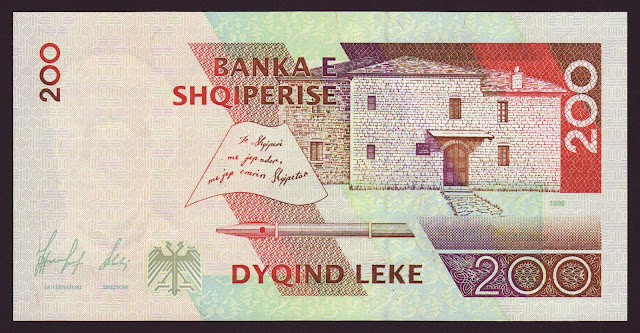Albania Banknotes 200 Leke banknote 1996 Naim Frashëri
Bank of Albania - Banka e Shqiperise
Obverse: Portrait of Naim Frashëri (1846-1900), one of the most distinguished writers of the Albanian Renaissance; an open book in the background.
Reverse: View of the house where Naim Frashëri was born; a page with verses from his poem “Herds and crops”; a stylised image of his pen.
Watermark: Portrait of Naim Frashëri.
Size: 138 mm x 69 mm
Dominant colour: brown in yellow
First in circulation on: 11.07.1997
The 200 Lekë note, issued in 1996, was first put in circulation on 11 July 1997. It was printed by "De la Rue" Company and reprinted in 2001 by "Oberthure" Company with improved security features. This note was put in circulation on 8 April 2002.
The note is manufactured from high quality cotton fibre security paper.
On 20 July 2009, the Bank of Albania put in circulation a 200 Lekë note of legal tender, issue of 2007, which retains the same design and dimension features as the 200 Lekë note, issue of 2001.
In the new banknote, security and damage-resistant elements are added or improved. Furthermore, signatures of the Governor and the Director of Issue Department, as well as the year of issue are updated. Older issues of 200 Lekë notes shall continue to be legal tender and shall continue to be in circulation along with the new note, issue of 2007.
Albania banknotes - Albania paper money
1996-2012 Issue
Naim Frashëri
Naim Frashëri (25 May 1846 – 20 October 1900) was an Albanian poet and writer. He was one of the most prominent figures of the Albanian National Awakening (Albanian: Rilindja Kombëtare) of the 19th century, together with his two brothers Sami and Abdyl. He is widely regarded as the national poet of Albania. He authored 22 works.
He was one of eight children of Halid Bey (1797–1859) and Emine Imrahor (1814-1861), born in the mountainous village of Frashër in the Sanjak of Delvina, Ottoman Empire (now southern Albania). The family was of Aromanian descent, the village being inhabited by Aromanians, today a mixed Albanian-Aromanian village. He spent his childhood in the village of Frashër, where he most likely began learning Turkish, Persian and Arabic, and went to the Bektashi tekke. After the deaths of their parents, the oldest, Abdyl (b. 1839), became the family head at the age of 22. Abdyl was a merchant. In 1865, the family moved to Ioannina (Sanjak of Ioannina). The younger brothers, Naim and Sami, attended the Zosimaia School.
As he hailed from a family with long connections to the Bektashi Sufi order, Naim became an Ottoman official in Sarandë, Berat, and Ioannina. In 1882, Frashëri went to Istanbul and started his service in Ottoman culture ministry.
Naim took part in the National Renaissance of Albania, and often had to sign his writings using his initials, as otherwise he would have placed himself in danger working in an official Ottoman position. His works had to be smuggled into Albania.
His earliest writings were poetry. The very first pieces Frashëri wrote were in Persian. In all, he authored twenty-two major works: four in Turkish, one in Persian, two in Greek and fifteen in Albanian. His early patriotic poems and highly popular lyric poetry were strongly influenced by Persian literature, and later also French poetry. He also translated several fables of Jean de la Fontaine, Homer's Iliad, and wrote articles on didactics and Islamic practice. Naim's poem Herds and Tillage depicts the activities of the shepherd and the tiller, alongside his personal reflections on the beauty of Albanian landscapes and expressions of longing for his homeland. The epic poem Skanderbeg's Story retells the life of the Albanian national hero George Kastrioti Skanderbeg intertwined with imaginary episodes.
Frashëri died in Kızıltoprak, Kadıköy, a neighborhood of Istanbul, in present-day Turkey.
The renowned Albanian poet was also Ali Sami Yen's uncle, founder of the Turkish football club Galatasaray.

